Daily Zohar # 3722 – Vayelech – Amen to the blessings
Hebrew translation:
.
Zohar Vayelech
#35
1 Samuel 2:30
“לָכֵן נְאֻם יְהוָה אֱלֹהֵי יִשְׂרָאֵל אָמוֹר אָמַרְתִּי בֵּיתְךָ וּבֵית אָבִיךָ יִתְהַלְּכוּ לְפָנַי עַד עוֹלָם וְעַתָּה נְאֻם יְהוָה חָלִילָה לִּי כִּי מְכַבְּדַי אֲכַבֵּד וּבֹזַי יֵקָלּוּ”
“Therefore YHVH God of Israel says: ‘I said indeed that your house and the house of your father would walk before Me forever.’ But now the LORD says: ‘Far be it from Me; for those who honor Me I will honor, and those who despise Me shall lose honor.”
He asks what does it mean “those who despise Me shall lose honor”? And answers it is about those who don’t know how to unify the Holy Name, connect to him with faith, and draw blessings where it is needed. Those who don’t know how to honor their master would have been better for them if they weren’t born.
#36
Rabbi Yehuda explains that “those who despise Me shall lose honor” means that those who don’t honor their creator and didn’t do the right meditation when saying ‘Amen’ to blessings. He quotes the Talmud saying ( ( https://www.sefaria.org/Berakhot.53b.27?lang=bi&with=all&lang2=he )
לְמֵימְרָא דִּמְבָרֵךְ עֲדִיף מִמַּאן דְּעָנֵי ״אָמֵן״? וְהָתַנְיָא רַבִּי יוֹסֵי אוֹמֵר: גָּדוֹל הָעוֹנֶה ״אָמֵן״ יוֹתֵר מִן הַמְבָרֵךְ. The Gemara asks: Is that to say that one who recites a blessing is preferable to one who answers amen? Wasn’t it taught in a baraita that Rabbi Yosei says: The reward of the one who answers amen is greater than the reward of the one who recites the blessing?
Rabbi Shimon explained that the one who answers Amen draws blessings from the source Binah to the King, Zeir Anpin, and the King to the Queen. From the writings of Rabbi Elazar, he says, that the Alef א of Amen, that is Binah, to the Mem מ of Amen that is Zeir Anpin, and from the Mem of Amen to the Nun ן that is Malchut. From there, the blessings continue to the upper, and the lowers and all. A voice comes out and announces, drinking from the blessings that person brought out. He is a servant of the Holy King.
{||}

 Previous: Vayelech
Previous: Vayelech

